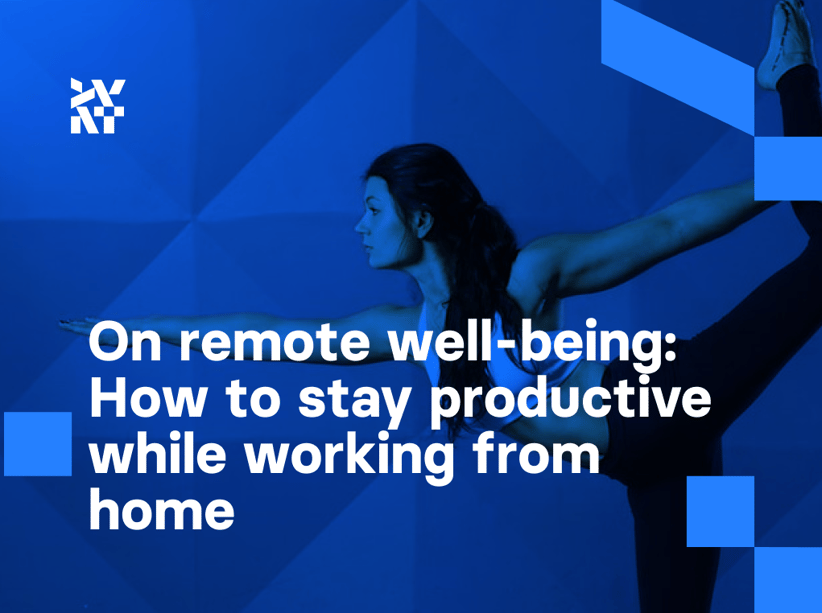The pandemic changed our world, and probably for good. It also changed the way we work. Many people would like to continue working remotely even after the pandemic is over, which shows this is a positive change for many. That doesn’t mean that working remotely comes with no challenges. In fact, on the contrary. Even if you had previously worked effectively from home, the external circumstances were very different before the pandemic. Concerns about the health crisis or future of the economy can contribute to growing feelings of anxiety, which, in turn, can result in a lack of focus and a drop in productivity.
Countless challenges can affect your work performance. Isolation from coworkers can have a negative effect on you, your focus, effectiveness, and mental well-being. How can you avoid it? First of all, remember that we’re in a situation that is new for all of us.
“I have experience with remote work, but the pandemic gave working from home a different feel. I think we should not hesitate to admit that the pandemic does not favor remote work. It is great that a lot of companies are allowing people to work from home. However, such a big transition in times of uncertainty and urgency, combined with a lack of preparation, tools, and education, is hard. Before coronavirus, you had the opportunity to go out after work, meet your friends, grab a beer, go to the movies. Now you can not do any of those things. Pandemic makes you feel stressed, overwhelmed, and beyond exhausted. Not to mention, quite often, our families are at home at the same time, so it is even more distracting.”
– Marta Ciesielska, Project Manager
It’s not you. It’s everyone
If working from home is hard, don’t beat yourself up. The current situation can make you feel lonely and isolated, and you may think you’re the only one struggling. You shouldn’t worry because you’re not alone. We all go through the same challenges and face insecurities and anxieties. For all of us, no matter what age, job level, or experience, this is a completely new situation, and it’s a scary one. Not only do we worry about the health of our loved ones, but we’re also affected by the economic uncertainty we may be facing in the future.
“Just like everyone else, I have moments of lower energy and motivation. Especially during the wintertime, our internal clock slows down because there is less sunshine. We should not demand 100% productivity from ourselves, but try to focus on priorities and on what is easier to accomplish. Try to find joy in your work, focus on learning, teamwork, soft skills. Start your day by talking to nice people, and share your struggle.”
– Marta Ciesielska, Project Manager
To avoid feeling lonely, make sure you stay connected, attend meetings, and turn your camera on. You’ll notice the difference quickly. Carry on socializing. Talk to family and friends, even if only on the phone or online. Organize a coffee chat at work, and make time for small talk before meetings. These steps to maintain your connections serve a purpose, too.
Know thyself
Let’s face it. You’re on your own now more than ever. Treat this time as an opportunity to up your managerial skills. Plan your work around your natural energy levels and your sleep cycle. If your company offers a flexible schedule, remote work gives you an unprecedented chance to work during the times that work best for you, whether it’s early in the morning or late in the afternoon.
Try journaling. Observe yourself and your frame of mind. Notice when you’re the most productive, but also know when to pause and take a break.
“My life is mostly dominated by my dog’s routine :) Walking him is my natural boundary between work and private life. I don’t have a morning routine, but I have one in the evening. Before I close my laptop, I check all my meetings for the next day and ask myself if it is necessary for me to be there. I review my agenda and my inbox for any overdue messages. I’m a big fan of the Todoist app, so I check my tasks there. This approach makes it easier for me to start right away the following morning.”
– Marta Ciesielska, Project Manager
Be realistic in your planning. Too many tasks can be overwhelming. It’s important to manage your own expectations, too. If you struggle with getting things done, set one big goal per day, and then focus on that goal and nothing else. You’ll be surprised how much you can achieve.
Focus
There is no productivity without focus. It’s easy to get distracted when you’re working from home. Family, house chores, and your warm and cozy bed can all make your focus blur and distract you away from work. It’s key to organize your workspace and time by, for example, using time and task management tools. (link to the blog post https://divante.com/blog/which-tools-to-use-for-remote-work-part-i/)
Work on your start and stop routine. There’s no need for the commute, but it’s still good to have some kind of transition to and from work. Create some sort of a ritual that will mark the beginning and end of work time for you, even if it doesn’t require leaving your home. A few good examples are wearing your work clothes or preparing your morning coffee in a special mug. Those little routines will also help you keep more regular hours.
“Since I work remotely, I try to maintain the routine that I would have if I had to commute to the office. I don’t get up five minutes before work starts but, at least, one hour before. I do this to have time for yoga, a nice breakfast, and to schedule tasks for the day. I also try to dress “normally.” Sweatpants are not allowed during working hours ;) It allows me to “feel” like I am at work, especially since I have my camera turned on very often during meetings. I think Slack is my favorite communication tool. It allows me to use gifs and emojis, which I love ;)”
– Marta Jakubczak, Communication Specialist
Having a designated spot in your home where you “go to work” will result in less distraction and deeper focus.
“I have a two-bedroom apartment. I have a desk near a window in one room. It stands in a way so I have a clear division from the “play area.” I recently changed the position of my desk to look out of a window instead of facing a wall, which I recommend. This is good for your eyes to let them rest and wander. You don’t need to have a totally separated space. It can be a nominal division.”
– Marta Ciesielska, Project Manager
Focus on what you can control. This will not only increase your productivity but also help you to avoid falling into depression and anxiety. Limit your news and social media intake. Stick to unbiased and reliable sources for information. Use apps to limit notifications from Facebook or Twitter.
“I stopped following the news. I think it can pull you into this spiral of negative thoughts and in effect, you’ll require professional help. This is also nothing wrong. A therapist or psychiatrist is a medical practitioner like any other. It is especially important to remember this right now. I try to be kind to myself, not to expect too much, hug my “inner child,” and find pleasure and joy in my work.”
– Marta Ciesielska, Project Manager
Don’t just sit there
We’re social and creative animals, and those two things often go together. You may find it difficult to stay creative while sitting alone in front of your laptop all day. We all need other people to stay curious and creative. It’s easy to find ourselves in a rut with no energy or new ideas when there are no colleagues to challenge us or to bounce ideas off of.
How can you deal with this challenge? Think about changing your environment and trying different work setups. Whatever works to stimulate your senses. I’m talking about all of the senses. – Try music, aromatherapy, or adding some color. Add some green plants or fresh flowers to your working area. Plants not only filter the air, but they also help us manage stress, focus our energy, and increase productivity.
Utilize the commute time you’ve saved while working from home. Read a book, learn something new, or take on a new hobby. Go for a walk, or simply open a window for some fresh air. Take a break, exercise, or try mindful breathing.
“I try to move every hour and have a stretch. We have a wellness program at Divante: 15 minutes for health stretching, which is a nice benefit. It is also worth mentioning that you have a five-minute break for each hour when working full time. You can use those five minutes to walk around. There are a lot of exercise options you can find online.”
– Marta Ciesielska, Project Manager
There are plenty of ways to deal with stress and become better at working remotely. Only choose the options that suit you and your circumstances. We’re all different and need different ways to cope. Some tips that work for your colleagues, might not work for you, and that’s to be expected. Stay curious, and be kind to yourself. The pandemic will end eventually, and we’ll come out of it stronger and wiser.
Published March 31, 2021











